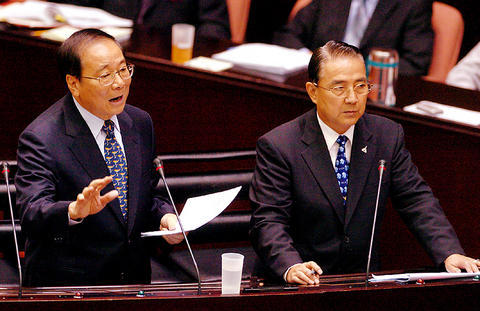Premier Chang Chun-hsiung (張俊雄) yesterday dismissed allegations by Chinese Nationalist Party (KMT) Legislator Su Chi (蘇起) that the Democratic Progressive Party (DPP) government was developing nuclear weapons to confront China's military threat and as a bargaining chip to negotiate with the US.
Chang made the rebuttal on the legislative floor during a question-and-answer session with Su.
Su said that President Chen Shui-bian (陳水扁) had told the Ministry of National Defense (MND)-affiliated Chungshan Institute of Science and Technology to develop a nuclear weapon.

PHOTO: LIAO CHEN-HUEI, TAIPEI TIMES
He also said that nuclear experts and a former national defense minister from a country equipped with nuclear weapons had been invited to discuss the issue.
Besides developing a nuclear weapon, Su said Chen was also pushing for the mass production of the locally developed Hsiung Feng II-E cruise missile.
political asylum
Su also said that Chen would seek political asylum in the US to protect himself from possible imprisonment over his role in the special allowance case when his presidential term comes to an end next year.
"With the development of the Hsiung Feng II-E and nuclear weapons, we are becoming another North Korea," said Su, a senior KMT member of the legislature's National Defense Committee.
Su said that he had obtained the information from a DPP Central Executive Committee member but he did not name the individual, nor did he provide proof to back his claims.
Dismissing Su's allegation, Chang insisted that the country had no plan to develop a nuclear weapon.
"This is a serious accusation. As the premier, I assured you that Taiwan is a democratic country with no plans or intention to develop nuclear weapons," the premier said.
"Taiwan will not produce, develop, acquire or use nuclear weapons," he said.
Su also said that the MND had plans to produce 245 Hsiung Feng II-E missiles and had requested NT$34.6 billion (US$1.06 billion) over eight years from the classified portion of the ministry's budget.
Earlier this week the ministry sought NT$3.8 billion for the missile project for next year, but lawmakers cut the budget by one-third, froze another one-third and passed the remainder.
range
The missiles are believed to have a range of between 600km and 1,000km, putting Hong Kong and Shanghai within their range, depending upon the type of engine used.
"The real problem, however, is not the nuclear weapon or the missiles," Su said.
"The real problem is that we have an abnormal president. He is going to use those weapons for his own interests," he said.
Minister of National Defense Lee Tien-yu (
Lee said that the missiles are being developed for defensive purposes, rather than with any intention of starting a war.

NATIONAL SECURITY THREAT: An official said that Guan Guan’s comments had gone beyond the threshold of free speech, as she advocated for the destruction of the ROC China-born media influencer Guan Guan’s (關關) residency permit has been revoked for repeatedly posting pro-China content that threatens national security, the National Immigration Agency said yesterday. Guan Guan has said many controversial things in her videos posted to Douyin (抖音), including “the red flag will soon be painted all over Taiwan” and “Taiwan is an inseparable part of China,” while expressing hope for expedited “reunification.” The agency received multiple reports alleging that Guan Guan had advocated for armed reunification last year. After investigating, the agency last month issued a notice requiring her to appear and account for her actions. Guan Guan appeared as required,

A strong cold air mass is expected to arrive tonight, bringing a change in weather and a drop in temperature, the Central Weather Administration (CWA) said. The coldest time would be early on Thursday morning, with temperatures in some areas dipping as low as 8°C, it said. Daytime highs yesterday were 22°C to 24°C in northern and eastern Taiwan, and about 25°C to 28°C in the central and southern regions, it said. However, nighttime lows would dip to about 15°C to 16°C in central and northern Taiwan as well as the northeast, and 17°C to 19°C elsewhere, it said. Tropical Storm Nokaen, currently

‘NATO-PLUS’: ‘Our strategic partners in the Indo-Pacific are facing increasing aggression by the Chinese Communist Party,’ US Representative Rob Wittman said The US House of Representatives on Monday released its version of the Consolidated Appropriations Act, which includes US$1.15 billion to support security cooperation with Taiwan. The omnibus act, covering US$1.2 trillion of spending, allocates US$1 billion for the Taiwan Security Cooperation Initiative, as well as US$150 million for the replacement of defense articles and reimbursement of defense services provided to Taiwan. The fund allocations were based on the US National Defense Authorization Act for fiscal 2026 that was passed by the US Congress last month and authorized up to US$1 billion to the US Defense Security Cooperation Agency in support of the

PAPERS, PLEASE: The gang exploited the high value of the passports, selling them at inflated prices to Chinese buyers, who would treat them as ‘invisibility cloaks’ The Yilan District Court has handed four members of a syndicate prison terms ranging from one year and two months to two years and two months for their involvement in a scheme to purchase Taiwanese passports and resell them abroad at a massive markup. A Chinese human smuggling syndicate purchased Taiwanese passports through local criminal networks, exploiting the passports’ visa-free travel privileges to turn a profit of more than 20 times the original price, the court said. Such criminal organizations enable people to impersonate Taiwanese when entering and exiting Taiwan and other countries, undermining social order and the credibility of the nation’s